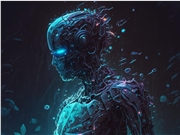Recently, a singer who faced vocal challenges due to a neurological condition managed to transform a damaged recording into a clear and powerful vocal performance using Suno AI's "Cover" tool, perfectly presenting their creative vision. This case not only demonstrates the breakthrough application of AI in the music field but also provides new possibilities for people with physical disabilities to return to the artistic stage. AIbase has compiled the latest online information to deeply analyze this moving story and the mysteries behind the technology.

Image source note: The image is generated by AI, and the image authorization service provider is Midjourney.
AI Empowers the Voiceless Singer: From Damaged Recording to Perfect Performance
This singer was unable to fully express their musical creation due to a neurological disease that restricted vocal expression. However, Suno AI's "Cover" tool provided a solution to break through these physical limitations. The singer simply needed to upload the damaged original recording, and AI could automatically analyze the melody, lyrics, and emotional intent within it, generating a vocal track highly consistent with the expected performance. The generated audio track not only retained the singer's creative style but also presented professional-level singing effects through repairing pitch, tone, and subtle tonal changes.
AIbase learned that Suno AI's "Cover" tool excels in handling complex vocal tasks. For example, in a song titled "Change," AI accurately completed missing notes using intelligent algorithms; in another song called "From," AI simulated delicate vocal changes the singer couldn't achieve, such as vibrato and emotional transitions. This technological breakthrough allowed the singer to present their work with a voice close to their ideal state, regaining confidence in music creation.
Suno AI’s “Cover” Tool: How Technology Changes Music Creation
Suno AI's "Cover" tool is based on generative AI models combined with deep learning and speech synthesis technologies, capable of extracting key musical elements from limited inputs and generating high-quality vocal performances. The specific process includes:
Voice Analysis: AI analyzes the original recording to identify lyrics, pitch, and rhythm, capturing the singer's creative intent.
Track Reconstruction: Using pre-trained vocal models, AI repairs tone defects, enhances sound quality, and generates clear, natural-sounding vocal effects.
Personalized Customization: Users can adjust style, emotion, or tone via text prompts, such as mimicking specific singers or music genres.
According to information organized by AIbase, Suno AI's vocal generation technology relies on large-scale voice datasets for training, capable of producing tracks almost indistinguishable from human singing. Compared to traditional voice synthesis tools, this technology has significantly improved in emotional expression and tone authenticity, especially suitable for handling complex vocal tasks.
Breaking Physical Limitations: AI Empowers the Disabled
This case highlights the immense potential of AI in enhancing accessibility in music creation. For artists unable to sing normally due to neurological diseases, vocal cord injuries, or other physical disabilities, Suno AI's "Cover" tool offers a new way of creating. Singers no longer need expensive recording equipment or professional vocal restoration; they can achieve high-quality music production simply by uploading an audio file.
AIbase noticed that similar technologies have already shown potential in other fields. For instance, AI voice synthesis technology is used to help ALS patients regain communication abilities, and Suno AI's innovation further extends this capability to the realm of art creation. By empowering disabled individuals to express themselves, AI not only transforms traditional music creation models but also opens the door to art for more people.
Industry Impact: AI Reshapes the Future of Music Creation
Suno AI's "Cover" tool is not only a boon for individual artists but also brings far-reaching impacts to the entire music industry. AIbase believes this technology may drive the following transformations:
Democratization of Creation: Anyone can create high-quality vocal works without professional singing ability through AI generation.
Personalized Music Production: AI supports diverse styles and tone customization to meet the unique needs of different creators.
Promotion of Accessibility Technologies: Providing creation tools for the disabled, promoting inclusivity in the music industry.
Meanwhile, Suno AI's technology faces challenges, such as ensuring the originality of generated tracks and protecting artists' rights in commercial applications. AIbase predicts that future Suno AI may further standardize the use of AI-generated music through collaboration with music copyright institutions.
Suno AI's "Cover" tool, with its powerful voice analysis and generation capabilities, provides the possibility for voiceless singers to return to the stage and sets a new benchmark for accessibility in music creation. This technology not only showcases AI's creativity in the arts but also conveys the warmth of technology empowering humanity.









